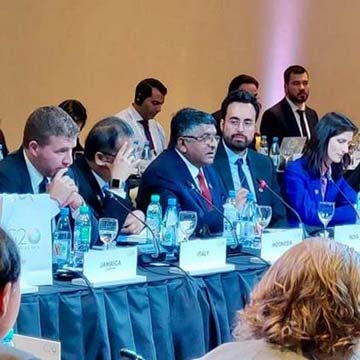 Salta:
Salta: At the G20 Digital Economy Ministerial Meeting in Salta, in the north-west of Argentina, G20 ministers and senior officials issued a declaration that reflects the G20's commitment towards promoting “policies and actions that catalyze digital transformations.
The Digital Economy Ministerial Meeting, held on 23-24 August, was attended by 33 heads of delegation- Ministers, senior officials and representatives from invited countries and international organizations, like EU, UNCTAD, ITU etc. India was represented by Union Minister for Electronics and IT & Law and Justice, Ravi Shankar Prasad.
Building on the contributions of the G20 Digital Economy Task Force, delegates deliberated upon efforts to create conditions that help governments, the private sector and civil society maximize the benefits and confront the challenges posed by technological progress.
The other focus area of the meeting was digital inclusion, in particular the gender divide. Other related issued such as Digital government, digital infrastructure and measuring the digital economy were also deliberated.
Addressing the Plenary of the G-20 Digital Economy Ministerial meeting, Sh. Prasad said that India’s digital story is a story of hope and growth; of opportunities and profits. But above all it is a story of digital inclusion and empowerment.
Digital India is a mass movement today touching the lives of a billion people. Minister Prasad said that he was very assured to note that an important theme of the meeting was bridging the gender divide adding that gender empowerment was an important focus for his government.
Highlighting the enormous scale of India’s digital infrastructure that included 1.21 billion mobile phones, of which 450 million are smartphones, nearly 500 million internet subscriber and an ever increasing broadband availability being supported by optical fibre connectivity in 250,000 village clusters, Minister Prasad said that the success of Digital India programme lay in the conscious efforts to bridge the digital divide and promote digital inclusion, based upon technology which is low cost, affordable, developmental and which fosters empowerment and inclusion.
The Minister, in particular, highlighted the important role played by India’s home grown technologies for promoting digital payment, including importance on interoperable open-source technologies so that these platforms can be used by others to develop more innovative structures as well as leading to new norms of digital identity based authentication which are a generation ahead.
All this is in addition to the stellar role played by India’s IT companies, which have left their mark in 200 cities of 80 countries, enabling India to emerge as a profound digital power, with India’s digital economy likely to become 1 trillion $ economy in the next 3-5 years, he added.
Minister Prasad said that India believed in internet access for all, adding that the Internet is one of the finest creations of the human mind, but it cannot be the monopoly of a few. He also stated that while Cyber-space is truly global, it must be linked with local ideas, local culture and local views. He said that the largest and most dynamic markets for digital services are in Asia, Latin America and Africa with India having one of the largest foot-print of several popular social media and other digital platforms. It is only fair and just that the revenue and profit generated from these platforms be equitably reinvested in the largest markets to create more infrastructures and generate more job opportunities for the people there, he added.
Minister Prasad articulated India’s concerns about data protection and individual privacy and informed the meeting that India had already put in place stringent measures backed by laws passed by the parliament. He said that privacy cannot prohibit innovation nor can privacy become the shield for the corrupt or terrorists. We need data to improve business but the data must be anonymous, objective, and taken with consent, he added.
Minister Prasad stressed that India had taken a serious note of reported misuse of social media platform data. Such Platforms will never be allowed to abuse our election process for extraneous means, he added. He said that the purity of the democratic process should never be compromised and that India will take all required steps to deter and punish those who seek to vitiate this process.
India’s views received wide appreciation and support from several delegations including the hosts Argentina, Germany and the EU. Several other countries like Saudi Arabia, Russia, Indonesia and Japan expressed a keen desire to work with India in a range of IT and cyber related fields. India also presented a non-paper at the meeting listing its experience of using government platforms for inclusion and economic development, which was well received.
The meeting saw great interest in India’s JAM trinity of more than 300 million bank accounts of the poor along with Aadhar and mobiles which is empowering the poor by direct benefit transfer of their welfare entitlement into their bank account.
The G20 member nations agreed to promote policies that will contribute to bridging all forms of digital divide, with special attention to the digital gender divide. The countries agreed to promote digital government and digital infrastructure, strengthen the digital skills of the workforce, deepen the analysis towards digital economy measurement, and to share experiences and lesson learned”.
The G20 Ministerial meeting allowed India to showcase the inclusive use of digital technology by the Government to empower the people. It also allowed India to articulate it's views on global issues relating to cyber security, data protection and innovation for growth.
 Salta: At the G20 Digital Economy Ministerial Meeting in Salta, in the north-west of Argentina, G20 ministers and senior officials issued a declaration that reflects the G20's commitment towards promoting “policies and actions that catalyze digital transformations.
Salta: At the G20 Digital Economy Ministerial Meeting in Salta, in the north-west of Argentina, G20 ministers and senior officials issued a declaration that reflects the G20's commitment towards promoting “policies and actions that catalyze digital transformations. 